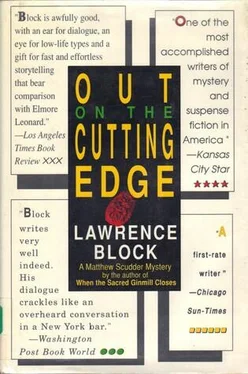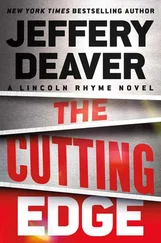Lawrence Block
Out on the cutting edge
for my cousin
Jeffrey Nathan
1943–1988
I sit in one of the dives
On Fifty-second Street
Uncertain and afraid
As the clever hopes expire
Of a low dishonest decade:
Waves of anger and fear
Circulate over the bright
And darkened lands of the earth,
Obsessing our private lives;
The unmentionable odor of death
Offends the September night…
— W. H. AUDEN
“September 1, 1939”
When I imagine it, it is always a perfect summer day, with the sun high in a vivid blue sky. It was summer, of course, but I have no way of knowing what the weather was like, or even if it happened during the day. Someone, relating the incident, mentioned moonlight, but he wasn’t there either. Perhaps his imagination provided the moon, even as mine chose a bright sun, a blue sky, and a scattering of cottony clouds.
They are on the open porch of a white clapboard farmhouse. Sometimes I see them inside, seated at a pine table in the kitchen, but more often they are on the porch. They have a large glass pitcher filled with a mix of vodka and grapefruit juice, and they are sitting on the porch drinking salty dogs.
Sometimes I imagine them walking around the farm, holding hands, or with their arms around one another’s waists. She has had a lot to drink, and it makes her boisterous and flamboyant and a little unsteady on her pins. She moos at the cows, clucks at the chickens, oinks at the pigs, and laughs at the whole world.
Or I’ll see them walking through woods, then emerging at the bank of a stream. There was a Frenchman a couple hundred years ago who always painted idealized rustic scenes, with barefoot shepherds and milkmaids cavorting in nature. He could have painted this particular figment of my imagination.
And now they are naked, there by the stream’s side, and they are making love in the cool grass.
My imagination is limited in this area, or perhaps it is simply a respecter of privacy. All it provides is a close-up of her face. Expressions play on her face, and they are like newspaper articles in dreams, shifting and going out of focus just before I can read them.
Then he shows her the knife. Her eyes widen, and something goes out of them. And a cloud moves to cover the sun.
That’s how I imagine it, and I don’t suppose my imagination comes very close to actual circumstances. How could it? Even eyewitness testimony is notoriously unreliable, and I’m the furthest thing from an eyewitness. I’ve never seen the farm. I don’t even know if there’s a stream on the property.
I never saw her, either, except in photographs. I’m looking at one of those photos now, and it seems to me that I can almost see the play of expressions on her face, and her eyes widening. But of course I can see no such thing. As with all photographs, all I can see is a moment frozen in time. It’s not a magic picture. You can’t read the past in it, or the future. If you turn it over you can read my name and telephone number, but when you turn it over again it’s the same pose every time, the lips slightly parted, the eyes looking into the camera, the expression enigmatic. You can stare at it all you want and it’s not going to tell you any secrets.
I know. I’ve looked at it long enough.
There are three prominent fraternal organizations for actors in New York, and years ago an actor named Maurice Jenkins-Lloyd had summed them up to anyone who’d listen. “The Players are gentlemen,” he’d intoned, “pretending to be actors. The Lambs are actors, pretending to be gentlemen. And the Friars — the Friars are neither, pretending to be both.”
I don’t know which category Jenkins-Lloyd belonged in. When I knew him he was mostly drunk, pretending to be sober. He used to drink at Armstrong’s, which used to be on Ninth Avenue between Fifty-seventh and Fifty-eighth. His drink was Dewar’s and soda, and he could drink it all day and all night without showing it much. He never raised his voice, never turned ugly, never fell off his chair. Toward the end of an evening he might slur his words some, but that was about it. Player, Lamb, or Friar, he drank like a gentleman.
And died of it. I was still drinking myself when he died of a ruptured esophagus. It’s not the first cause of death you think of for alcoholics, but it doesn’t seem to happen to other people. I don’t know exactly what causes it, whether it’s the cumulative effect of pouring booze down a gullet for all those years or the strain of vomiting a couple of times every morning.
I hadn’t thought of Maurice Jenkins-Lloyd in a long time. I thought of him now because I was going to an AA meeting on the second floor of what used to be the Lambs Club. The elegant white building on West Forty-fourth had some years ago become a luxury the Lambs could no longer afford, and they had sold the property and shared space with another club somewhere else in midtown. A church of some sort had bought the property, and it now housed an experimental theater along with facilities for other church activities. On Thursday nights, the Fresh Start group of Alcoholics Anonymous paid a nominal fee for the use of a meeting room.
The meeting ran from eight-thirty to nine-thirty. I got there about ten minutes early and introduced myself to the program chairman. I helped myself to coffee and sat where he indicated. There were eight or ten six-foot tables arranged in an open rectangle, and my seat was at the far end from the door, next to the chairman’s.
By eight-thirty there were about thirty-five people sitting around the tables and drinking coffee out of Styrofoam cups. The chairman opened the meeting and read the preamble, then called on someone to read a portion of the fifth chapter of the Big Book. There were a few announcements — a dance that weekend on the Upper West Side, a group anniversary in Murray Hill, a new meeting added to the schedule at Alanon House. A group that met regularly at a Ninth Avenue synagogue was canceling its next two meetings because of the Jewish holidays.
Then the chairman said, “Our speaker tonight is Matt, from Keep It Simple.”
I was nervous, of course. I’d been nervous from the minute I walked into the place. I’m always like that before I lead a meeting, but it passes. When he’d introduced me there was a round of polite applause, and when it died down I said, “Thanks. My name is Matt, and I’m an alcoholic.” Then the nervousness was gone, and I sat there and told my story.
I talked for about twenty minutes. I don’t remember what I said. Essentially what you do is tell what it used to be like, what happened, and what it’s like now, and that’s what I did, but it comes out different every time you tell it.
Some people’s stories are inspirational enough for cable television. They’ll tell you how they were down and out in East St. Louis and now they’re president of IBM with rising expectations. I don’t have that kind of story to tell. I still live in the same place and do the same thing for a living. The difference is I used to drink and now I don’t, and that’s about as inspirational as I get.
When I finished there was another round of polite applause, and then they passed a basket and everyone put in a dollar or a quarter or nothing at all toward the rent and the coffee. There was a five-minute break, and then the meeting resumed. The format varies at different meetings; here they went around the room, and everybody had his turn to say something.
There were maybe ten people in the room I recognized and another half-dozen or so who looked familiar. One woman with a strong jawline and a lot of red hair took off from the fact that I’d been a cop.
Читать дальше












